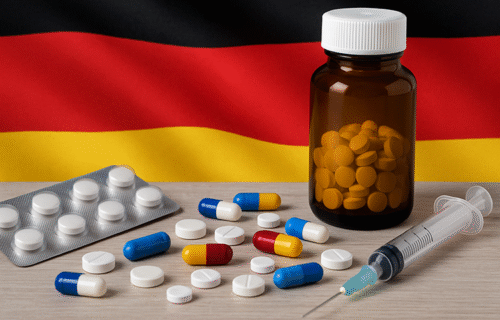Threatened tariffs and proposed price caps on medicines in the United States are creating mounting challenges for Germany’s pharmaceutical industry, which relies heavily on exports to the US, its most significant single market. The American market currently accounts for around 23 percent of all German pharmaceutical exports. Nicole Bludau, Risk Services Manager at international credit insurer Atradius, warns that exports could decline by as much as 35 percent if the trade dispute escalates. Such developments could drive up medicine costs, hinder research efforts, and cause drug shortages.
While the pharmaceutical industry has traditionally been one of Germany’s more resilient economic sectors, new US tariff policies threaten to disrupt this stability. If negotiations fail and tariffs on medicines and pharmaceutical products take effect as planned on 1 August, significant price increases are expected in Germany. The extent of the price hikes will depend on the level of the imposed tariffs. According to Nicole Bludau, companies will be forced to implement substantial cost-cutting measures to offset rising costs. In a more optimistic scenario, drug prices could increase by around 10 percent if US tariffs reach 20 percent and pharmaceutical firms manage to reduce their costs by half. However, in a worst-case scenario involving 50 percent tariffs, medicine prices could rise by as much as 30 percent.
Bludau also noted that higher prices could further strain supply chains, particularly if health insurers are unwilling or unable to cover increased costs. She emphasized that the situation goes beyond a simple trade conflict between nations and instead exacerbates existing challenges faced by health insurance providers, ultimately impacting patients.
A steep drop in US exports of up to 35 percent would significantly affect revenues for German pharmaceutical companies, especially those focused on research and development. Lower profits would limit resources available for investment in innovation, potentially weakening Germany’s position as a key pharmaceutical hub and jeopardizing long-term supply security. Bludau pointed out that some pharmaceutical manufacturers are exploring options to relocate operations abroad to mitigate rising costs, but this approach carries risks, as much of their research funding remains tied to Germany. A shift away from the domestic market could therefore deepen research deficits.
Although major pharmaceutical distributors currently feel resilient, medium-sized companies with strong exposure to the US market are facing growing pressure. Atradius has placed a substantial proportion of firms in the sector under heightened monitoring. Nicole Bludau indicated that, while the industry does not yet show signs of widespread imbalance, certain companies may need to brace for significant revenue losses if the proposed US trade measures come into effect. She added that reports of payment defaults remain limited for now, though this could change rapidly if trade tensions intensify.
Author: Atradius
